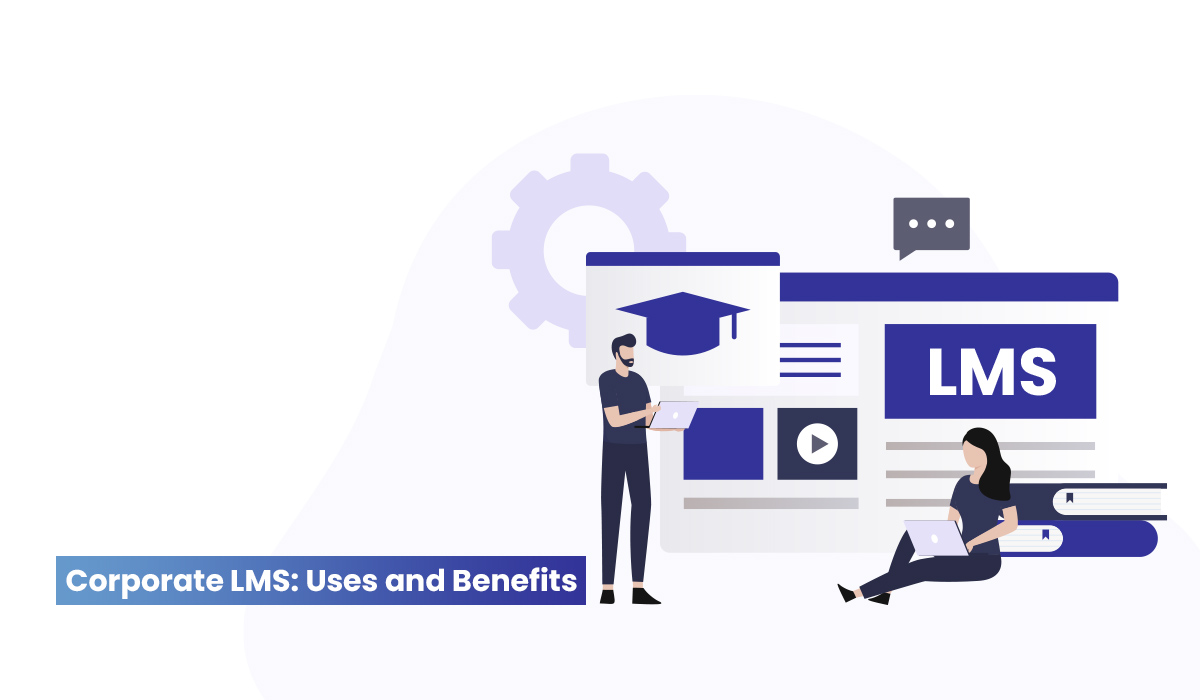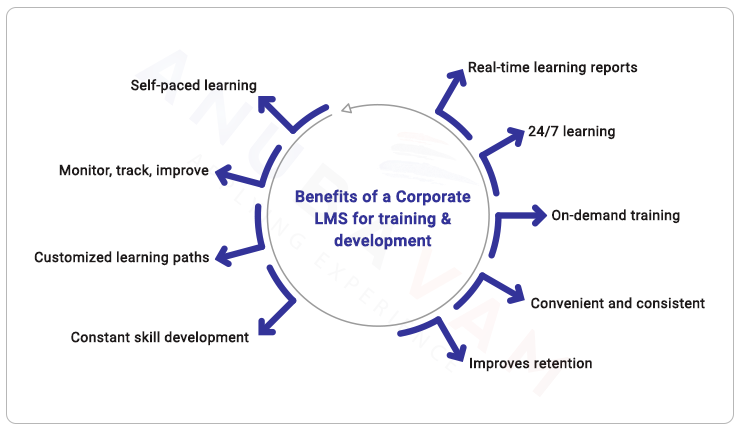Top 9 benefits of a corporate LMS for employee training and development

Organizations around the world are relying on Corporate LMS to create a strong platform for corporate training and meet the training needs of a diverse learner demographic as there is an increasing need to promote effective learning. In this article, we discuss the benefits of a corporate learning management system for organizations as well as what an LMS can do to enhance learning and development in your people.
What is the corporate learning management system?
A learning management system (LMS) is a piece of software that manages, controls, monitors, and delivers learning. LMSs support hybrid training models like blended learning and the flipped classroom approach in addition to having features that allow for the delivery of fully automated online training. They provide training materials, manage exams and assignments, monitor learners' progress, handle record-keeping, and provide ongoing training support to employees.
The organization will greatly benefit from the use of LMS for managing employee training. When the entire training initiative is system-driven, the data shows trends, a knowledge matrix, skill gaps, insights, and—most importantly—helps you create a learning culture in your business. As a result, the company develops and maintains its competitiveness and innovation.
Benefits of a Corporate LMS for employee training and development

1. Standard and self-paced learning
Employees find face-to-face training to be boring because they already know half of the material or, occasionally, because they can't understand the trainer's accent. Some additionally find it difficult to keep up with those around them. LMSs allow companies to curate content and courses in several languages, allowing people to take it at their own pace without having to adjust to their peer's pace. And if someone has trouble understanding or cannot provide an answer, they can simply repeat the material until they do, preventing humiliation in front of peers and inferiors!
2. Monitor, track, and continuously improve
Every organization's top priorities are fostering ongoing employee development and maintaining compliance. This is made possible by a learning management system, which keeps track of who has completed the training and their performance levels. Best LMS platforms allow managers to track employee progress, identify areas where additional training is needed, and measure the effectiveness of training programs.
3. Customized learning paths for employees
When an organization provides training based on your department, role, prior performance, skill gaps, and career path, the effectiveness of employee training increases quickly. Employers can direct learners' journeys along career paths by using an LMS. When learning and growth are mutually reinforcing, employees' perceptions of the value and relevance of training begin to soar. Additionally, performance in all divisions and locations soars to new heights when learning is strategically planned in an organization.
4. Constant skill development
Although today's learners place a high value on skill development, they also want their education to be accessible whenever they need it or have the time and desire to finish it. A corporate LMS enables students to access their course materials whenever it is most convenient for them. The procedure is simple, and because the LMS tracks their progress, even if students decide to stop the course, they can resume where they left off. On the basis of the learners' needs, their job role, the training requirements, their location, etc., an LMS can also assign learning resources automatically.
5. Real-time learning reports and analytics
The goal of training should be to provide management, HR, and the training department with insights. It should also let the employees be aware of their level of skill and knowledge in relation to expectations and actuals.

6. Learning anytime, anywhere
Organizations are delivering their training on laptops, smartphones, and tablets as a result of the rising buzz surrounding mLearning, or mobile learning. By delivering eLearning in the form of mobile apps, videos, and other formats to mobile devices, a device-responsive LMS can open the door to learning at any time, from anywhere.
7. On-demand training
An LMS gives employees access to around-the-clock learning material, allowing them to take training whenever they want and review them as often as necessary to retain what they have learned.
8. Convenient and consistent
Corporate LMS platforms provide employees with 24/7 access to training materials, which means they can learn at their own pace and on their own schedule. It provides access to a wide range of courses and materials, from basic skills training to more advanced professional development.
9. Improves retention
The interactive and repetitive nature of LMS training can lead to improved retention and recall of material. They come with high levels of personalization options, such as recommending courses based on the employee's role, skills, and experience.
Want to know more?
Want to learn more about the corporate learning suites and how to get the most out of your current LMS platform to increase the return on your training investment? We at Anubavam have extensive 15-year experience managing the top LMS platforms in the world. Visit our LMS expertise page or contact our solution team to schedule a call.
Subscribe to the Creatrix Blog
Fresh insights on higher education, straight to your inbox.
We respect your privacy.
Want to contribute?
We welcome thought leaders to share ideas and write for our blog.
Become a Guest Author →
